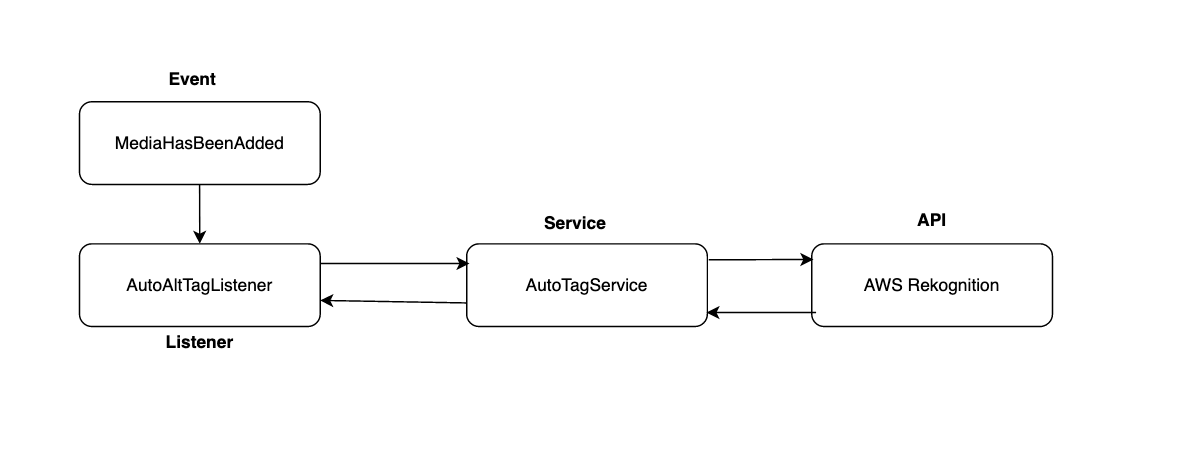I recently implemented a feature in our API that automatically creates alt tags for all images uploaded with Spatie Laravel-medialibrary. This allows all images added to automatically be tagged with AWS’s Rekgonition API, saving our marketing team hundreds of hours per year.
Getting Started
This is how the feature works:
- We start with
Spatie\MediaLibrary\MediaCollections\Events\MediaHasBeenAddedevent that fires when a new media item is added. - Next, we listen for that event in our
AutoAltTagListenerlistener class. - Using Laravel’s DI container, we will inject our
AltTagServiceinto the handler. - That service will call AWS Rekognition API to provide the image tags for the image.

Could you handle everything in the listener?
Of course. But, we want to decouple the auto alt tagging logic into a service, so that we could use it in other areas of the application by registering a service provider.
Step 0 - Setup AWS IAM permissions for AWS Rekgonition
For this service to work, the AWS credentials you’ve provided in your application need to have permissions to use the AWS Rekognition API.
Step 1 - Add Rekognition Client Configs
So that you can follow along, I’ve organized this project to have the credentials for AWS Rekognition in our config/services.php file, under the index of rekognition:
// config/services.php
// ...
'rekognition' => [
'key' => env('AWS_ACCESS_KEY_ID'),
'secret' => env('AWS_SECRET_ACCESS_KEY'),
'region' => env('AWS_DEFAULT_REGION', 'us-east-1'),
],Step 2 - Create the service
This portion is a bit up to you, but I like to create a app/Services folder. Assuming that structure, let’s create a file app/Services/AltTagService.php
Within that file, this is what we want our service to look like:
<?php
namespace App\Services;
use Aws\Credentials\Credentials;
use Aws\Rekognition\RekognitionClient;
use Illuminate\Support\Facades\Http;
class AltTagService
{
protected $rekognition;
public function __construct()
{
$rekognitionCreds = config('services.rekognition');
$credentials = new Credentials($rekognitionCreds['key'], $rekognitionCreds['secret']);
$this->rekognition = new RekognitionClient([
'credentials' => $credentials,
'region' => $rekognitionCreds['region'],
'version' => 'latest'
]);
}
public function getAltTags(string $url)
{
$response = Http::get($url);
if($response->successful())
{
$result = $this->rekognition->detectLabels([
'Image' => [
'Bytes' => $response->body()
],
'MaxLabels' => 12,
'MinConfidence' => 65.00,
]);
$prefix = 'Image of ';
return $prefix . collect($result->toArray()['Labels'])->implode('Name', ', ') . '.';
}
}
}Step 3 - Register Service Provider
We’ll run
php artisan make:provider AltTagServiceProviderThis will create a file at app/Providers/AltTagServiceProvider.php
Then, we’ll want this file to look like this:
<?php
namespace App\Providers;
use App\Services\AltTagService;
use Illuminate\Support\ServiceProvider;
class AltTagServiceProvider extends ServiceProvider
{
/**
* Register services.
*
* @return void
*/
public function register()
{
$this->app->singleton(AltTagService::class, function ($app) {
return new AltTagService();
});
}
/**
* Bootstrap services.
*
* @return void
*/
public function boot()
{
//
}
}If you’d like to learn more about binding to the service container, check out Binding Basics
Great! Now, we can access this service anywhere in the app through the container.
Step 4 - Create the listener
Next, let’s run:
php artisan make:listener Media/AutoAltTagListenerThis will create a file in app/Listeners/Media/AutoAltTagListener.php.
Here’s where we will call the service we registered above in the constructor of our listener in the following code:
<?php
namespace App\Listeners\Media;
use App\Services\AltTagService;
use Illuminate\Contracts\Queue\ShouldQueue;
use Illuminate\Queue\InteractsWithQueue;
use Spatie\MediaLibrary\MediaCollections\Events\MediaHasBeenAdded;
class AutoAltTagListener
{
protected $altTagService;
/**
* Create the event listener.
*
* @return void
*/
public function __construct(AltTagService $altTagService)
{
$this->altTagService = $altTagService;
}
/**
* Handle the event.
*
* @param object $event
* @return void
*/
public function handle(MediaHasBeenAdded $event)
{
if (! $event->media->hasCustomProperty('alt')) {
$event->media
->setCustomProperty('alt', $this->altTagService->getAltTags( $event->media->getUrl() ))
->save();
}
}
}Step 5 - Register the event listener
Nothing special here, we’re just going to register the listener as we would any other in our EventServiceProvider.php:
Spatie\MediaLibrary\MediaCollections\Events\MediaHasBeenAdded::class => [
\App\Listeners\Media\AutoAltTagListener::class
]Conclusion
You can now upload files with the Spatie media library. The alt tag should be available on any media model via the getCustomProperty method.
An example:
$altTag = $myMediaModel->getCustomProperty('alt');Enjoy!
 Share on Bluesky
Share on Bluesky 
